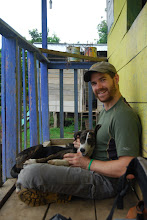---
It looks too steep. Experimentally I push a slab onto the snow and let it go. It drops away rapidly, picking up speed, and throwing a spray of snow into the air, turns on edge and rolls and bounds like a clumsy wheel all the way to the bottom, shattering on the rocks below.
What I need is a breaking device. An ice axe now would be the thing; I could squat on my heels and glissade sown the snowfield in good form, controlling direction and velocity by dragging the blade in the snow.
I launch a second big stone, and watch it go down with similar results. I see it now, the point is to stay flat. The pitch of the snowfield is less steep at the bottom; it should be possible to slow down or stop before smashing into the rocks at the lower edge.
I choose a third flat rock and drag it into the margin of the snowfield. Facing downhill with my heels braced in the snow, I straddle the rock, grasp and elevate its forward edge with both hands, and sit down firmly (my stick braced under my arm) and sit down firmly, taking a deep breath.
Nothing happens. My feet are still dug in and seem unwilling to obey my command to rise-instinct more powerful than reason. I urge them again; grudgingly they come up.
Too late for arguments now and as usual not enough time for panic. We're sledding down the mountain at a sensational clip, accelerating according to formula. I brake my speed with my boot heels as best I can but I can't see a thing because of the gush of snow flying in my face. Halfway down I lose the slab I'm riding and go on for a piece without it. The rock follows hard upon me, almost at my neck. I manage to recapture it and climb partway back on but before I can get comfortable again I see an outcrop of immovable granite, which I hadn't noticed before, rising in our path. I abandon the slab, roll to the side, and go skidding past the obstacle by an adequate margin. Things are out of control at this point but fortunately the snowfield begins to level off. I get my boots in front of my body, dig in, and coast to a stop a few feet short of the broken rocks at the bottom of the couloir. As I sit there resting another loose object thunders by on my left, perhaps the same rock or part of it that I had started down with. A moment later comes my walking stick.
---
This is a passage from Desert Solitaire, by Edward Abbey. He wrote this during his several summers spent working for the forest service in Moab. If you like this, read the book, enough said.
This passage reminds me of a mixture of many of my experiences in the woods the past several years.
It reminds me of when Silas and I were working on trail crew in the Adirondacks together. Building staircases out of boulders we would quarry out of the ground with 20lb rock bars, we would roll and hump these rocks across the ground, up slopes, and haphazardly down the other side, until sweating and encrusted with the marrow of things, we would be ready to dig a hole to cradle this behemoth, or if we were lucky a co-worker friend would have it semi-ready for us to finish.

I remember one perfect quarry site where many of our chuckling guffaws echoed through the forest and across the lake at the bottom of the hill. Peaked Pond. Amidst a cracking outcrop of boulders were rocks the size of small Hondas. Some of these rocks found their way over to the trail to a new resting place, while others which we deemed too large to work with were sent careening over the ten or twelve foot cliff, a few hundred feet through the forest where they smacked into the trunks of towering birches, maples, oaks, some two feet wide, leaving gaping wounds on some while others were simply sheered off by the largest boulders.
Our crew leader spent hours placing the rocks we quarried while she left us to our own devices a hundred yards away through the forest. I suppose she would pause between grunting movements with the rock, and at hearing our shouts of laughter as another boulder crashed through the woods she would smile with satisfaction. As destructive as it was, we felt as innocent as kids again. As wrong as it was, those trees grow back, and those memories continually draw me back into the canopy of a mountain forest.


